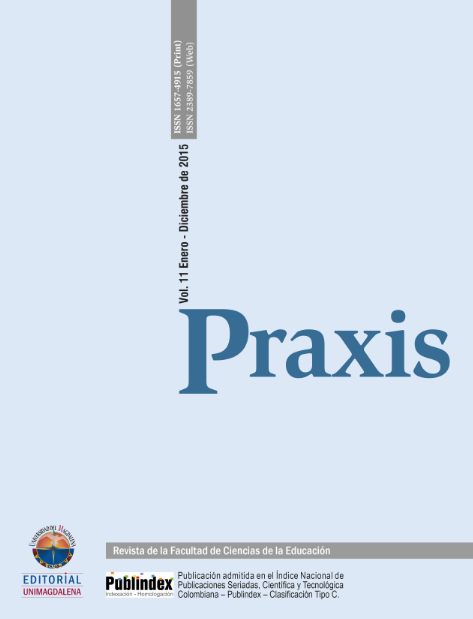Abstract
The current investigation had as an objective to inquire about the parental teaching styles in families with children that show special educative needs, which assist to “Institución Educativa La Libertad” in Samacá-Boyacá, trough methodology of qualitative investigation, with a critic-social focus starting off the method of critic ethnography. The population for the current research was composed by fifteen families of the municipality. The information collection strategy was based in the application of interviews, life’s reports, investigative workshops and field diaries. The result analysis was performed from the categorical system, which allowed seeing that the parental teaching styles in population are established as a consequence of cultural factors and lived experiences of parents in their childhood, besides was evidenced that parents don’t share a same parental style, because the paternal figure shows negligence in the care and education of its children, while the maternal figure is considered the only responsible of the care of children and other responsibilities of home.References
Aguirre, E. (2000). Socialización y prácticas de crianza. En E. Aguirre y E. Durán. Socialización: Prácticas de Crianza y cuidado de la salud. Bogotá, D. C.: CES- Universidad Nacional de Colombia.
Aranda, I. (2009). Las necesidades educativas especiales. La relación escuela- familia- comunidad. Cuadernos de Educación y Desarrollo. Vol 1, Nº 7 Malaga, España.
Atkinson, P., & Hammersley, M. (1994). Etnografía: métodos de investigación. Barcelona, España.
Avila, L., Malagon, A., & Triana, A. (2010). Prácticas de crianza y cuidados en niños y niñas de en Boyacá. Revista Latinoamérica de ciencias sociales y niñez, 8 (2): 933 – 945.
Baumrind, D. (1966). Effects of authoritative control on child behaviour. Child Development, 37, 887-907.
Bonilla, E., & Rodríguez, P. (1997). Más allá del dilema de los métodos: la investigación en ciencias sociales. Editorial norma. Bogotá, Colombia.
Borke, J., Lamm, B., Eickhorst, A., & Keller, H. (2007). Father-infant inte-raction, paternal ideas about early child care, and their consequences for the development of children´s self-recognition. The Journal of Genetic Psychology. 168; 365-379.
Carr, W., & Kemmis, S. (1988). Teoría crítica de la enseñanza. La investigación-acción en la formación del profesorado. Barcelona, España.
Ceballos, E & Rodrigo, M. (1998). Las metas y estrategias de socialización entre padres e hijos. En Rodrigo, M & Palacios, J (Ed). Familia y desarrollo humano, Madrid: Alianza.
Creswell, J. W. (2009). Research Design: qualitative, quantitative, and mixed methods approaches (3.ª ed.). Londres: Sage.
Del Pozo, A., Cabanyes, J., & Polaino, A. (2003). Fundamentos de psicología de la personalidad. Navarra, España.
Esteves, E., Jiménez, T., & Musito, G. (2007). Relación entre padres e hijos adolescentes. Editorial Nau Llibres. Valencia.
Hernandez, Fernandez & Baptista. (2010). Metodología de la investigación. McGRAW-HILL. Ed. S.A de C.V.
Maccoby, E. & Martin, A. (1983). Socialization in the context of the family: parent-child interactions. E.M. Hetherington & P.H. Mussen (eds.). Socialization, personality and social development. Handbook of child psychology, Vol. IV. Cap. 9: 1-102. New York: Wiley.
Myers, R. (1994). Prácticas de crianza. Bogotá: CELAM-UNICEF.
Myers, R. (1994). Prácticas de crianza. Bogotá: CELAM-UNICEF.
Olson, D. H., Sprenkle, D. H., & Russell, C. S. (1979). Circumplex model of marital and family systems: I. Cohesion and adaptability dimensions, family types and clinical applications. Family Process, 18, 3-28.
Palacios, J., & Rodrigo, M. J. (1998). La familia como contexto de desarrollo humano. En M. J. Rodrigo & J. Palacios (coords.), Familia y desarrollo humano, 25-38. Madrid: Alianza Editorial.
Patton, M. Q. (1988).How to Use Qualitative Methods in Evaluation. Newbury Park-California: Sage.
Reynaud, B., & Sanchez, J. (1996). Psicología y problemática social. México.
Sandoval, C. (1996). Programa de especialización en teoría, métodos y técnicas de investigación social, investigación cualitativa. Bogotá. Arfo Editores e Impresores Ltda.
Sandoval, C. (2002). Investigación Cualitativa. Editores e Impresores. Bogotá, Colombia.

